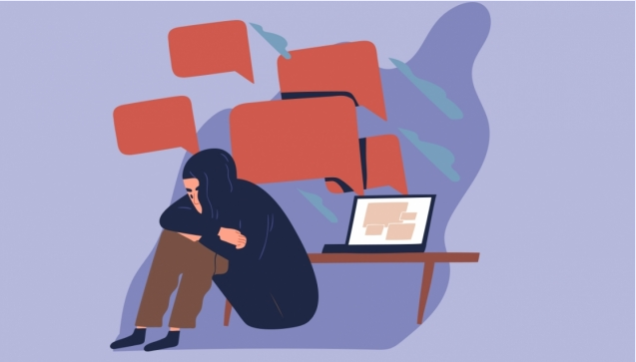We are all trying to adjust in the pandemic world. In order to ensure their employee’s safety, more and more companies are allowing their employees to work from home. Unfortunately, with rise in work from home, there has been rise in case of virtual sexual harassment.
These are tough times, not just for women who have to share the extra load of taking care of kids studying in online classes , but also for men who are all of a sudden confronted with different responsibilities and insecurities that all genders face when it comes to the future at the workplace, or the loss of a dear one. All of these will have a deep impact on the mental health of employees and as a result acts of sexual harassment may only rise even while working from home.
A study by the Pew Research Center found that 41 per cent of American adults have been the subject of some type of harassment online. Even more staggering, one in five people have experienced extreme forms of digital harassment, including online sexual harassment.

As per a study by ComplyKaro Services ,in the year 2019 India Inc reported a 14% increase in sexual harassment complaints compared to 2018 .This year, it’s going to be a challenge to map cases since subtler forms of sexual harassment are on the rise in the work-from-home setup and many people don’t even realize they are facing it, say experts.
Request to keep video on in all virtual meetings, WhatsApp queries about what one is wearing or doing have replaced long stares in the office, unwelcome calls or messages at odd hours have become more common, and sexist remarks have moved to the virtual workspace.
Being a PoSH Consultant and champion for women empowerment, I have been flooded with queries from corporates and women employees about what constitutes (virtual) sexual harassment and how to handle such cases .Does a comment “ Please move on the camera, I can’t see you properly” constitute sexual harassment ? It depends, if the comment made you feel uncomfortable
So, I decided to describe in detail, what constitutes virtual sexual harassment .
A workplace under the PoSH Act is elaborately defined. However, for a layman , it is where an employee performs work, which includes a house as well.
The following are included as part of Virtual Sexual Harassment :-
- Demanding to keep video on in all virtual meetings, especially after offices hours
- Taking screenshots of women colleagues during a meeting
- Woman receiving unwelcome materials and content that is posted about her
- Comments or rumours about the victim’s sexuality or sexual activities
- Sharing sexually explicit photos without consent. Accused may post this content on their social media pages or online forums or share through WhatsApp.
- Using sexual or gender-based derogatory terms to describe the victim
- Sending sexually suggestive messages through a digital platform
- Personal comments on the person’s social media handles
- Inappropriate or sexist jokes to ‘lighten’ the mood
- Not maintaining a dress code during video conferences
- Managers compelling employees to join in ‘night suit’ zoom parties
Why Virtual Sexual Harassment Occurs?
- In most of the sexual harassment complaints, the alleged perpetrators are in a position of power. With Covid19, there is an overwhelming sense of job insecurity among employees. This has led to increase on harassment cases.
- The irony of the situation is that people don’t realize what they doing is wrong, because for most harassment means physical touch. Also, most of the men have a very strong patriarchal mindset and can’t realize their behaviour amounts to sexual harassment.
- For the abuser, virtual communication provides anonymity that can lead people to act in ways they would not do so and get away with in person.
- Because of the sudden onset of COVID-19, many employers have not prepared for a teleworking workforce and, as a result, many have not established teleworking policies or agreements that would help to guide employees in this new remote workplace environment.
How to protect your employees against virtual sexual harassment?
Because we spend so much of our time online, virtual sexual harassment has become a major, yet sometimes overlooked, issue both at home and in the workplace. Here’s how you can protect your employees.
Filing complaints is more difficult in a WFH scenario due to lack of awareness.
However, it has also made evidence gathering easier. Employees have taken screenshots, recorded meetings, and so on.
In the recent case of Sanjeev Mishra vs. Bank of Baroda, the Rajasthan High Court (“Court”) has widened the scope of the term ‘workplace harassment’ to include online harassment.
The Petitioners View
The petitioner in this case contended that since the petitioner and the complainant were situated in two (2) different States, the Authority did not have jurisdiction in this matter. It was contended that as per the Bank of Baroda Officer Employees’ (Discipline and Appeal) Regulations, 1976 (“Regulations”) an inquiry can only be initiated if sexual harassment is committed at the workplace and during the working hours . Since the petitioner and the complainant were residing in different States and messages were sent after the working hours a charge sheet could not have been issued to the petitioner and no inquiry could be conducted.

The Court’s Verdict
The Court held that in the present digital world, ‘workplace’ for employees working in different branches of the same organization or different States shall be treated as one workplace on a digital platform. Regarding the second contention of the petitioner, the Court reasoned that even if obscene messages were sent by the petitioner after working hours, knowing fully well that the complainant is an employee of the Bank holding the position of a subordinate, it would still amount to workplace sexual harassment and prima facie would come within the meaning of misconduct under the Regulations.
- Companies to change their sexual harassment policies and clearly include the term “work from home”.
- Companies need to inform employees of procedures to redress cases arising out of working remotely. HR really needs to step up, and not brush the problems under the carpet, otherwise it can create a large-scale problem.
- Sensitization workshops should start up again to help people navigate this uncharted territory. Companies need to show employees where to draw the line between work and private life, and establish their own liability as employers.
- Employees also need to be sensitised on crossing boundaries in text messages. A remark made in person can hold different meaning from when it is conveyed over text.
- Employers should make it clear to employees that no form of sexual harassment whether face to face or virtual will not be tolerated .They should establish a specific complaint process for employees who have been sexually harassed over remote work tools, and act promptly when an employee alleges virtual or in-person sexual harassment
- Encourage senior management to set the tone of anti-harassment at the top. This means they should be role model for other employees i.e. Providing a safe environment for women to work , taking complaints seriously and being supportive of changes that could arise from an online sexual harassment incident.
- Encourage employees to speak up about virtual sexual harassment. Make reporting harassment safe and easy. Offer multiple reporting avenues, such as a dedicated phone number, email address and webform.
- Take prompt action when you receive reports. Ignoring reports or dragging the investigations sends a wrong message to employees.
Sexual harassment is a form of illegal gender discrimination, and online sexual harassment is just as much a crime as in-person sexual harassment is. Online sexual harassment doesn’t necessarily have to involve any face-to-face interactions between the perpetrator and the target. Both forms of sexual harassment can be significantly harmful to the victim, and those who are subjected to this form of harassment can suffer from emotional distress.
Shivani Bose is a PoSH certified trainer and has been instrumental in implementing PoSH across industries. She is an external panel member of ICC for various companies. She has conducted several workshops on Gender sensitization and PoSH awareness and had counselled several clients facing mental wellness and gender bias issues.
Proud HR Services is an end-to-end service partner for the implementation of Prevention of Sexual Harassment (PoSH) legal compliance. We partner with companies on case redressal and policies to proactively build safer work cultures and sexual harassment (PoSH) trainings either in person or virtually. We will establish and clarify the roles and functions of each member. We also provide training for all employees and ICC. We also help in empanelment of external members of IC.
For any queries related to PoSH Consultation, Training of Employees and ICC and/or empanelment of external panel member.
